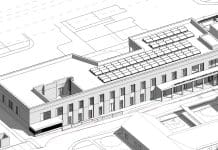A new report published at the annual conference of Constructing Excellence finds that the costs of modern methods of construction (MMC) are set to fall by a third, in line with growing demand
The report, conducted by Constructing Excellence, part of the BRE Group, in collaboration with Building Research Establishment (BRE), Rider Levett Bucknall (RLB) and Bristol City Council, reveals that MMC costs currently at around £3,000 per m2.
Right now, the cost is the result of small volumes and short pipelines for manufacturers, however, as manufacturers increase production levels and pipelines lengthen, costs could fall to roughly £2,000 per m2.
MMC is cost effective
The projection for MMC is cost effective and is already contributing to shorter building phases. Using MMC the average build is 72 compared to 112 weeks when using traditional methods.
Today’s report also aims to define ‘key performance indicators’ (KPIS) for MMC and compare these against existing housing delivery models to quantify the benefits of MMC.
BRE identifies the KPIs as:
- Cost, time, quality, health and safety, labour and requirements, environmental impacts, and local disruption.
In response to the report, Constructing Excellence is planning to host an MMC Group so that it can manage the gathering and measuring of KPI data across manufacturers and builds to further development in the sector.
Alison Nicholl, head of Constructing Excellence commented: “[The] prominence of MMC is growing, accelerated by the growing need to rethink our approach to construction to meet pressing delivery challenges.
“However… if we are going to truly advance the adoption of MMC and make it mainstream, we need to develop a much more tangible benefits case based on real data and evidence…
“What is already clear from this research is that delivery speed and qualitative benefits of MMC use are compelling which in turn leads to wider linked economic and societal benefits.”
‘MMC now becoming embedded within the residential sector’
Richard Quarry, partner and head of affordable housing at Rider Levett Bucknall, said: “As we see MMC now becoming embedded within the residential sector, especially for our affordable housing Clients, this report is extremely timely.
“As well as demonstrating the benefits through time savings and build-quality improvements and addressing site labour shortages, focusing conversations around data capture and a rounded set of KPIs to quantify benefits will help to embed processes and drive further adoption.”
MMC provides the opportunity to improve resource efficiency, build quality, environmental performance, and predictable timescales. However, KPIs have been historically difficult to measure owing to a lack of or limited available data on the impacts of this type of construction.
Therefore, despite the Government’s annual target of 300,000 factory made homes – only 15,000 homes are produced each year.
Around 3.9 million homes are required to meet the current and future demand and those targets cannot be achieved without the extensive roll-out of MMC.













